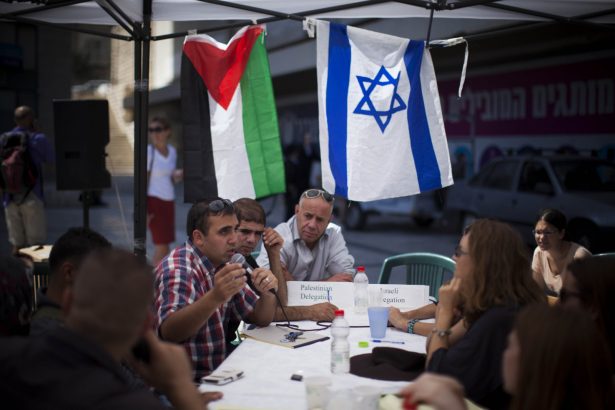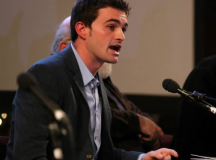This journal has long argued that people-to-people peacemaking programmes on a grand scale are essential to advance the stalled Middle East Peace Process. In 2017 we commissioned a major report, ‘A Future for Israeli-Palestinian Peacebuilding’, written by Ned Lazarus and introduced by Jonathan Powell, one of the architects of the Good Friday Agreement. This is the most important article we have published on the subject since then. John Lyndon, Executive Director of the Alliance for Middle East Peace (ALLMEP) calls on the UK to seize the moment ahead of June’s G7 to join with others to turn the bi-partisan Middle East Partnership for Peace Act (MEPPA), passed by Congress in 2020, into a Global International Fund for Israeli-Palestinian Peace, finally giving civil society the role it should always have had in the peace process. ‘The project can bind the US and the UK together in a brand new, post-Brexit institution and the UK can provide peerless insight and expertise in both conflict resolution and economic development, aiding the evolution of an institution that can have transatlantic cooperation at its core, and conflict resolution as its mission.’
The basic reality: a generation of Israelis and Palestinians has grown up more divided than any since 1967
The four years of the Trump administration often felt like an extreme weather event. Many battened down the hatches, clung on for dear life, and adopted a strategy of damage limitation. And when any storm clears we can see more clearly the underlying weakness of structures, the shoddy edifices blown away, weak foundations uncovered, showing us the true condition of what lies beneath.
On Israel/Palestine, President Trump aimed to upend a long-standing policy orthodoxy that his team shrewdly deduced was already crumbling. In its place, he tried to create a paradigm based on a crude but nonetheless accurate analysis of the prevailing power dynamics, and to pressure the Palestinians into accepting a peace plan that, by any objective analysis, offered them far less than any previous proposal, and which emptied the concept of two-state solution of its meaning. The Palestinians, surprising nobody, rejected the plan and — like many people around the world — hoped for the victory of Joe Biden, and the ‘return to normality’ that his campaign promised. Yet, in the bubble of Israeli-Palestinian diplomacy, the normality which preceded President Trump was anything but normal. The ‘peace process’ of the last 30 years has been an elite-driven project, based on a supposition that the gaps between both sides were small and bridgeable, and that one last round of shuttle diplomacy, or one more roll of the electoral dice could deliver a two-state solution which has — over time — become perhaps the most thoroughly researched, delineated and debated diplomatic project never to have been implemented. All the while, the conditions that made such an outcome feasible in 1993, 2000 or 2008 have been gradually disappearing.
In Israel we now have ample electoral evidence that a two-state solution has almost entirely disappeared from the agenda. A comfortable majority in the Knesset sworn in a few weeks ago is ideologically opposed to it, and even the Zionist Left has largely relegated it to the margins of its platform. While Palestinian elections may (or may not) come later this year, their polity remains fractured, with Gaza ruled by a terrorist organisation whose periodic flirtation with a two-state outcome fails to convince many, and with the West Bank governed by a leadership whose ability to deliver or implement such a solution is doubted by many. Meanwhile, the wider region is consumed with other issues that have long overtaken the Israeli-Palestinian conflict, and which have resulted in a wave of normalisation agreements with Israel. Palestinians fear these agreements sap what little leverage they have left to deploy in meaningful negotiations, should we ever see them again.
All of these factors are important reasons for why we are where we are. But if we could wish them away, we would still be stuck due to an even more basic reality: a generation of Israelis and Palestinians has grown up more divided than any since 1967, with the regime of walls, permits and closures resulting in ‘separation’ — a word that has replaced ‘peace’ or ‘two states’ in the Israeli political lexicon — without an end to occupation or any progress toward a final status agreement. The result is greater dehumanisation, ignorance, fear and racism, all of which fuel conflict. Many of the core ingredients necessary for human beings to engage in conflict resolution — familiarity, engagement, debate and discussion — have been rendered impossible. We have engineered a physical, psychological and political reality that is almost perfectly designed to impede successful conflict resolution.
The consequences are visible all around us: the broken diplomacy, the legitimisation of political actors and ideas that would have recently seemed beyond the pale, and the attitudes of majorities of ordinary Israelis and Palestinians, which of course drive the political dysfunction. As long as 90 per cent of Palestinians and 79 per cent of Jewish Israelis do not think it is even possible to trust one another[1], the identity of their prime ministers or presidents is largely secondary. And this crisis is most urgent amongst the young, who have no memory of the hopes of the 1990s, nor of the comparatively more open and simple — if still unjust — physical reality of the period that preceded it. Take a look at the faces of the Jews leading the racist and violent rampage through Jerusalem’s Old City this month, or of the Arabs delivering random beatings to religious Jews. The youngest Israelis and Palestinians — those who have only known this era of separation, war and resentment — are inheriting a crisis that rapidly escalating, with fewer of the tools or insights necessary to navigate it than their predecessors.
The median age of Israelis is 30. That means the majority of citizens are too young to really remember the handshake on the White House Lawn between Yasser Arafat and Yitzhak Rabin, but are old enough to remember bombs exploding on buses ten years later during the relentless suicide attacks of the Second Intifada. Benjamin Netanyahu has been Prime Minister for half their lives, and won every election they’ve been old enough to vote in. They have almost certainly never had a meaningful conversation with a Palestinian about how this reality might be changed.
For Palestinians, the median age is 20, so most citizens were born after the Oslo Accords collapsed into the violence of the Second Intifada. Those in the West Bank do not remember a time before the regime of separation, with its daily humiliations and frustrations, and with the number of settlers having more than doubled in their lifetimes. For Gazans, the median age is 16. Every day of their lives has been under Israeli-Egyptian blockade. They’ve lived through three devastating wars — waged by a people they have never laid eyes on, never mind spoken to — and are ruled by a cruel authoritarian regime that limits what little freedoms might be possible under endless siege. They have almost certainly never had a conversation with an Israeli about anything, never mind discussed how this reality might be changed.
One More Heave Won’t Do
Elite-level diplomacy has very little chance of success in such a context, something it appears that the international community is beginning to wake up to. Toward the end of his term, then-Secretary of State John Kerry reflecting on his energetic but unsuccessful attempt to revive a process that many warned was already dead or dying remarked, ‘In the end, I believe the negotiations did not fail because the gaps were too wide, but because the level of trust was too low. Both sides were concerned that any concessions would not be reciprocated and would come at too great a political cost. And the deep public scepticism only made it more difficult for them to be able to take risks.’[2] Former US Ambassador and Special Envoy Martin Indyk similarly concluded, ‘The difficulties we faced were far more because of the 20 years of distrust that built up than because of the core issues that divide the two sides.’[3]
As they wade through the wreckage of the Trump era, that reality seems to have been absorbed by the Biden administration, who show no sign of hurrying to convene peace talks. ‘The only way to ensure Israel’s future as a Jewish, democratic state and to give the Palestinians a state to which they are entitled is through the so-called two-state solution,’ Secretary of State Antony Blinken said during his confirmation hearing. He then added, however: ‘I think realistically it’s hard to see near-term prospects for moving forward on that.’ As frustrating as that analysis may be to hear, it is hard to argue with. And it is unlikely to change unless the civic and political variables that affect it are upended.
A Bottom-Up Approach is the New Realism
The frustration is that there exists a suite of programmes and projects that are demonstrated to be highly effective at halting and reversing the sort of attitudes that make peace so unlikely at this moment. The people-to-people peacebuilding programmes run by ALLMEP’s 140+ members are proven, in study after study, to transform the attitudes of participants, reversing fear and dehumanisation, creating ideas and institutions that can break the political deadlock, and producing citizens who place resolution of the conflict at the top of their political agenda, and as a core part of their very identities. A BICOM report on these programmes, in cooperation with ALLMEP and authored by Professor Ned Lazarus of George Washington University, found that they reliably – and often radically – impacted the attitudes of participants, and even resulted in positive changes in policy.
We know that these programmes transform individual lives: but we have never funded them at the sort of level that can transform whole communities, or a critical mass in each society. Why not? Together, these groups are doing the methodical spade-work necessary to open up new vistas of what is possible. They are the indispensable prerequisite of any societal change, but they lack scale, and political leaders ready to amplify and champion their vision. We cannot create the latter out of thin air. But succeeding in the former – exponentially growing these kinds of movements and ideas until their influence is felt throughout both societies – can foster an environment that incentivises and incubates the emergence of such leaders, both locally and nationally.
New Opportunity: The 2020 Nita M. Lowey Middle East Partnership for Peace Act (MEPPA)
Luckily, an unprecedented tool that is predicated on this observation has just emerged. The 2020 Nita M. Lowey Middle East Partnership for Peace Act (MEPPA) is a $250m bipartisan law aimed at disrupting and reversing these trends, funding both civil society and economic projects that can create the foundations for meaningful diplomacy, and representing the largest-ever investment in people-to-people peacebuilding programmes. Pioneered by the Alliance for Middle East Peace (ALLMEP) as part of its campaign to create an International Fund for Israeli/Palestinian Peace, MEPPA is inspired by the International Fund for Ireland (IFI), which delivered and unlocked over $2.4bn for civic and economic peacebuilding programmes in Northern Ireland. Starting 12 years before a peace agreement, it built the foundations and civic capacity that successful diplomacy needs, with Chief Negotiator Jonathan Powell calling it ‘the great unsung hero’ of the Good Friday Agreement.
One of the IFI’s important innovations was its multilateralism, pooling not just the resources of different donor states but also their legitimacy. In Northern Ireland, this meant ensuring that both the US — who enjoyed high levels of trust with the Nationalist community — and the UK and Commonwealth members — who were more trusted by the Unionists community — were key funders and architects of the strategy. This is a lesson that ALLMEP has brought to bear in its advocacy around MEPPA, with two international advisory board seats written into the legislation, and the potential for it to provide the seed for a fully internationalised structure that can draw together all key donors in this space, creating a multilateral approach that leverages the insights, resources, legitimacy and expertise from all key actors.
Enter the United Kingdom: Turning MEPPA into a real agent for change
That is where the UK comes in. In 2018, then Middle East Minister Alistair Burt endorsed the International Fund concept in the House of Commons. In a ninety-minute Westminster Hall debate on the topic last November, there was clear and unanimous cross-party consensus on the need for UK involvement in such a project. The debate was led by Labour’s Catherine McKinnell, a vice chair of Labour Friends of Israel and a member of Labour Friends of Palestine and the Middle East. Ms. McKinnell put it on record that: ‘An International Fund for Israeli-Palestinian Peace would provide that much-needed focus and investment to enable co-existence projects to operate at scale and to amplify their impact.’ She concluded by asking the Minister: ‘Will he meet me and other colleagues to discuss reinstating the UK’s financial support for peace-building work and reinvigorating support for the International Fund? Secondly, will he ask his officials to explore the possibility of the UK requesting one of two international partner seats in the new Middle East Partnership for Peace advisory board? Thirdly, at the earliest opportunity after 20 January, will he discuss with the Biden Administration how the Middle East Partnership Fund for Peace might evolve into a truly international institution?’
Ms. McKinnell’s intervention led to a commitment by James Duddridge, Under Secretary of State at the Foreign & Commonwealth Office, to ‘look specifically at whether we should take one of those seats and at the timing of commitments. There is no point deciding late in the day that we do want to commit and that we would have liked a seat.’ This point was taken up in Parliament last week by Labour MP Rosie Cooper and Conservative MP Sheryll Murray. They each asked Middle East Minister James Cleverly what the UK had done to move this priority forward since then, while also centring the possibility of the government using the G7 summit in June to, in Ms. Murray’s words, ‘underline our commitment to international institutions and multilateral cooperation’ and ‘take a seat on the International Fund.’ Minister Cleverly confirmed that the government ‘supported the objectives of the International Fund for Israeli-Palestinian Peace,’ and will ‘continue to engage with the Alliance for Middle East Peace and President Biden’s administration to identify further opportunities for collaboration.’
The G7: Seize the moment, Britain!
The UK would be wise to consider the opportunity of using the side-lines of the G7 as a venue to confirm British participation at the very core of this new project. Months after President Biden’s inauguration, interest is now also growing across Europe and among US allies around the world to take part. The appointment of Ambassador Samantha Power — a committed multilateralist and expert in conflict resolution — as the nominee for USAID’s administrator should encourage US partners to see the multilateral potential in a brand new instrument which already allows and incentivises the involvement of allies. Her appointment to sit at the National Security Council is an unusual honour for a USAID administrator, and a clear indication of how central the issue of development will be to the Biden administration’s wider foreign policy strategy. Ahead of June’s G7, the UK government has a ready-made project that it was itself the earliest advocate for, and one that can bind the US and the UK together in a brand new, post-Brexit institution. More than that, the UK can provide peerless insight and expertise in both conflict resolution and economic development, aiding the evolution of a brand-new institution that can have transatlantic cooperation at its core, and conflict resolution as its mission. The Quartet, the EU, and the UN can all have a role to play too, as — for the first time — can Gulf states like the UAE and Bahrain, allowing a multi-track and inclusive approach on a scale that has not been tried since Madrid in 1991.
Working alone, the UK and other similarly sized actors can do a lot of good. But the utility of working via a focused, multilateral institution such as an International Fund is the scale that it can unlock. Ambitious projects that engage tens of thousands of Israelis and Palestinians become possible. As do innovative approaches to health, the environment, agriculture and education, each of which require significant capital investment at the outset — with no single funder operating at the necessary scale — but then go on to create transformative partnerships that have the potential to impact millions of Palestinians and Israelis, and to reframe how each people thinks of the other. Take EcoPeace’s ‘Desalination/Solar Nexus’, which promises to link Israel, Palestine and Jordan in a cooperative and interdependent structure that can allow clean water and cheap energy for all. Or Project Rozana’s work to provide ventilators, vaccines and hospital equipment to clinicians in the West Bank and Gaza, all rooted in Israeli-Palestinian partnership. Or the Near East Foundation’s Olive Oil Across Borders programme, a cooperative farming project that provided over $20m in revenue to Palestinian farmers, and could be extended to other agricultural sectors. In each instance, smart and scalable plans are in place, but there is no funding source commensurate with the challenge.
Borrowing from the expertise that both the UK and US garnered in their support of the IFI, we could have incubators for peace projects, leadership institutes and a Centre for Peace — a physical space in Jerusalem, open to all — where young people come together to think, work and act in service of a just and agreed resolution to the conflict. For 30 years — starting 12 years before a peace treaty — the international community spent $44 per person annually on grassroots peacebuilding projects in Northern Ireland. By contrast, today it spends less than $2 among Israelis and Palestinians. Investment in these programmes, ideas and people is not a silver bullet. Like anything that is aimed at shifting long-running societal trends, it takes time for the results to emerge. But when they do, they are strong, robust foundations that real diplomacy and — ultimately — peace can be built upon, with a base of support in either society, citizens willing to fight for those ideals, institutions to support them, and new political leaders and ideas that will often emerge from those very same institutions.
The Lessons of the Good Friday Agreement
In Ireland, you can draw a line from Initiative’92, a civil society project, all the way through to the ideas that formed the Good Friday Agreement, and the movements and community activists that led the successful referendum campaign that secured its passage. At roughly the same time In Israel/Palestine, the Oslo Accords arrived out of nowhere, with no civil society role, capacity or agency in making them work. Suddenly, populations who had been conditioned to see each other as enemies were expected to trust one another with their safety and rights. It was all too easy for committed opponents of peace to overturn a process built on such feeble foundations.
For too long, the diplomatic approach to Israeli/Palestinian peace has neglected this civic and social dimension, and the need for active constituencies supporting peace and incentivising their leaders to pursue it. As Tony Blair said, the Good Friday Agreement ‘didn’t begin or come to fruition in a vacuum. There were many great things that happened before we even got to the negotiations that set the context, laid the ground, created the environments for the negotiation to succeed. One of those things was the International Fund for Ireland … the Fund for Middle East Peace can provide exactly the same source of stability for the Israeli-Palestinian conflict as it did for the Northern Ireland peace process.’
The tragic reality is that a final status deal that ends occupation and delivers peace and security to both Israelis and Palestinians looks unlikely in the immediate future, with almost all of the local and international variables misaligned. In retrospect, that diagnosis may have been broadly accurate, if less acute, since Prime Minister Rabin was assassinated 26 years ago. Yet we have remained focused on a short-term strategy regardless, believing one more round of shuttle diplomacy, or one more White House summit was all that was required, rather than a strategy that focused on the bottom-up dynamics that rendered such efforts doomed to failure, time and time again.
We do not have a time machine, and we cannot undo the errors of the past. But it is not too late to learn from those mistakes, as well as from the lessons of the most successful conflict resolution project that the US and UK together ever embarked upon. With Anglo-American leadership at its core, and $250m in funding already secured from Washington, an International Fund for Israeli-Palestinian Peace can be the foundation stone in a real peace process; one that puts Palestinian and Israeli citizens, their lived realities and their relationships with one another at its core rather than its margins, and — over time — transforms what politicians and diplomats can accomplish as a result. As Steve McCabe MP and Stephen Crabb MP said in their cross-party joint oped in The Times in March: ‘An international fund for Israel-Palestinian peace could not come at a better time. Britain should seize this moment to be part of it.’
References
[1]Palestinian-Israeli Pulse: A Joint Poll, Oct 2020, https://resolution.tau.ac.il/sites/socsci-english.tau.ac.il/files/media_server/resolution/Summary%20Report_%20English_Joint%20Poll%2026%20Oct%202020.pdf
[2] Braunold, Joel and Sarah Yerkes, ‘Is a peace deal possible if Israelis and Palestinians simply don’t trust each other?’ Brookings, Jan. 3, 2017, https://www.brookings.edu/blog/markaz/2017/01/03/is-a-peace-deal-possible-if-israelis-and-palestinians-simply-dont-trust-each-other/ (emphasis added). Last accessed Jan. 3, 2021.
[3] Landler, Mark, ‘A ‘Battered’ Mideast Envoy Steps Down, but Keeps a Bag Packed,’ The New York Times, Jul. 3, 2014, https://www.nytimes.com/2014/07/04/world/middleeast/martin-indyk-mideast-peace-talks.html (emphasis added). Last accessed Jan. 3, 2021.





































